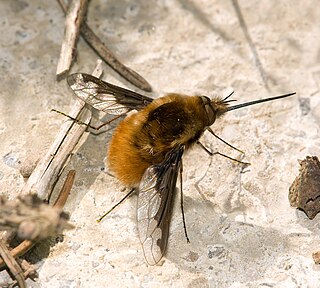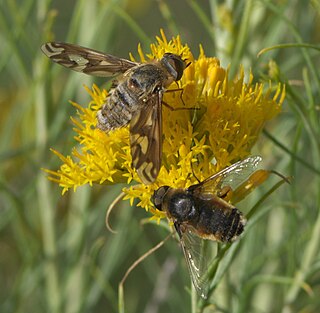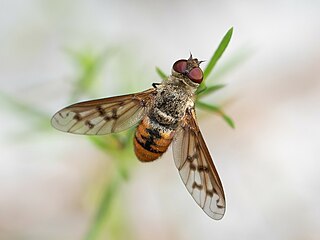
The Bombyliidae are a family of flies, commonly known as bee flies. Some are colloquially known as bomber flies. Adults generally feed on nectar and pollen, some being important pollinators. Larvae are mostly parasitoids of other insects.

Poecilanthrax willistonii, Williston's bee fly or sand dune bee fly, is a member of the Bombyliidae insect family. This family includes the bee flies, true flies that have developed Batesian mimicry characteristics to avoid predators. That is, they look like bees because that helps them avoid bee-wary predators, but they lack stingers.

Anthracinae is a subfamily of bee flies in the family Bombyliidae. There are more than 80 genera and 2,000 described species in Anthracinae.
Exoprosopa parda is a species of bee fly in the family Bombyliidae.

Villini is a tribe of bee flies in the family Bombyliidae.
Neodiplocampta mirella is a species of bee fly in the family Bombyliidae. It is known from California.

Neodiplocampta is a genus of bee flies in the family Bombyliidae. There are about 17 described species in Neodiplocampta, found in North and South America.

Triploechus novus is a species of bee flies, insects in the family Bombyliidae.

Exoprosopa divisa is a species of bee fly in the family Bombyliidae.

Exoprosopa fascipennis is a species of bee fly in the family Bombyliidae. It is widespread in North America, ranging across most of southern Canada and the United States, and is also reported from Cuba. The larvae are ectoparasites of solitary wasp larvae.
Paravilla syrtis is a species of bee fly in the family Bombyliidae. It is widespread in the arid regions of western North America, from the Yukon in Canada south through the United States and into Mexico.
Geminaria pellucida is a species of bee flies in the family Bombyliidae.
Bombylius validus is a species of bee flies in the family Bombyliidae.
Systropus angulatus is a species of bee fly in the family Bombyliidae. It is found in Texas.

Neodiplocampta miranda is a species of bee fly in the family Bombyliidae. It is found in the southern United States from Florida to California, and south through Mexico into Nicaragua.
Paracosmus edwardsii is a species of bee fly in the family Bombyliidae. It is known from California and Utah.
Paravilla aridula is a species of bee fly in the family Bombyliidae. It is found in Arizona and California.
Hemipenthes inops is a species of bee fly in the family Bombyliidae. It is found in the western United States. It is somewhat unusual compared to other members of the genus Hemipenthes in that its wings are mostly transparent.
Lepidanthrax arnaudi is a species of bee fly in the family Bombyliidae. It is found in California.

Dipalta serpentina is a species of bee fly in the family Bombyliidae. It is widespread in North America from British Columbia, Canada south and east through most of the United States to Florida, Mexico, Cuba, Guatemala, and Honduras. It is a parasitoid of antlion species such as Myrmeleon immaculatus.









